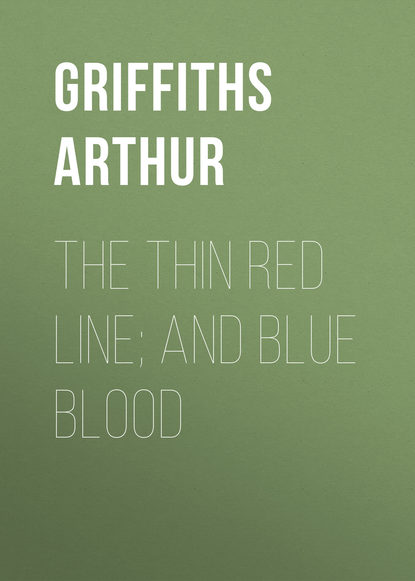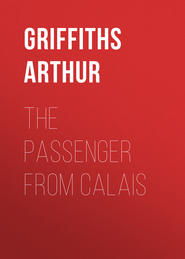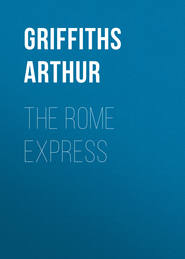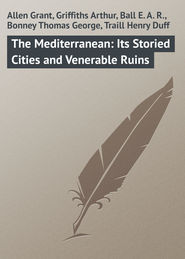По всем вопросам обращайтесь на: info@litportal.ru
(©) 2003-2024.
✖
The Thin Red Line; and Blue Blood
Настройки чтения
Размер шрифта
Высота строк
Поля
"Do you take sugar?" Harold asked, as he put a cup of tea into a hand exquisitely gloved.
She looked up at him sharply, but failed to detect any satire behind his words.
Harold thought that there was too much sugar and butter about her altogether. Even thus early he felt antipathetic; yet, when they were seated at dinner, and had an opportunity of observing her at leisure, he could not deny that she was handsome, in a striking, queenly sort of way; but he thought her complexion was too pale, and, at times, when off her guard, a worn-out, harassed look came over her face, and a tinge of melancholy clouded her dark eyes. But it was not easy to find her off her guard. The unceasing strife of several seasons had taught her to keep all the world at sword-point; she was armed cap-à-pie, and ready always to fight with a clever woman's keenest weapons—her eyes and tongue. Upon Harold she used both with consummate skill; it was clear that she wished to please him, addressing herself principally to him, asking his opinion on scientific questions, coached up on purpose, and listening attentively when he replied.
"How wise you have been to keep away from town these years! One gets so sick of the perpetual round."
"I should have thought it truly delightful," said Mrs. Purling, who, of course, took the unknown for the magnificent.
"Any honest labour would be preferable."
"Turn lady-help; that's my mother's common advice."
"Harold, how dare you suggest such a thing to Miss Fanshawe? Do you know she is a peer's daughter?"
"I thought you said housework would do for the daughters of kings; and you have proposed it to our cousin, Dolly Dri—"
"Were you at Ryde this year, Phillipa?" asked Mrs. Purling, promptly.
"No—at Cowes. We were yachting. Dreary business, don't you think, Mr. Purling?"
"I rather like it."
"Yes, if you have a pleasant party and an object. But mere cruising"—Miss Fanshawe was quick at shifting her ground.
"And you are going to Scotland?"
"Probably; and then for a round of visits. Dear, dear, how I loathe it all! I had far rather stay with you."
The heiress smiled gratefully. It was, indeed, the dearest wish of her heart that Phillipa should stay with her for good and all, and she was at no pains to conceal the fact. To Phillipa she spoke with diffidence, doubting whether this great personage could condescend to favour her son. But there was no lack of frankness in the old lady's speech.
"If you and he would only make a match of it!"
Miss Fanshawe squeezed Mrs. Purling's hand affectionately.
"I like him, I confess. More's the pity. I'm sure he detests me."
"As if it were possible!"
"Trust a girl to find out whether she's appreciated. Mr. Purling, for my sins, positively dislikes me; or else he has seen some one already to whom he has given his heart."
Mrs. Purling shook her head sadly, remembering artful Dolly Driver.
"You do not know all your son's secrets; no mother does."
"I do know this one, I fear."
And then Mrs. Purling described the absurd mistake in identity.
"You are not angry?" she went on. "For my part, I was furious. But nothing shall come of it, I solemnly declare. Harold will hardly risk my serious displeasure; but he shall know that, sooner than accept this creature as my daughter, I would banish him for ever from my sight."
"It will not come to that, I trust," said Phillipa, earnestly, and with every appearance of good faith.
"Not if you will help me, as I know you will."
Mrs. Purling was resolved now to issue positive orders for Harold to marry Miss Fanshawe—out of hand. But next day Phillipa suddenly announced her intention of returning to town.
"You promised to stay at least a month." The heiress was in tears.
"I am heartily sorry; but Cæcilia—Lady Gayfeather—is ill and alone. I must go to her at once."
"You have a feeling heart, Phillipa. This is a sacred duty; I cannot object. But I shall see you again?"
"As soon as I can return, dear Mrs. Purling—if you will have me, that is to say."
The story of Lady Gayfeather's illness was a mere fabrication. What summoned Phillipa to London was this note:
"I must see you. Can you be at Cæcilia's on Saturday?—G."
Phillipa sat alone in Lady Gayfeather's drawing-room, when Mr. Jillingham was announced.
"What does this mean?" she asked.
"I'm broke, simply."
"You don't look much like it."
To say the truth, he did not; he never did. He had had his ups and downs; but if he was down he hid away in outer darkness; if you saw him at all, he was floating like a jaunty cork on the very top of the wave. He was a marvel to everyone; it was a mystery how he lasted so long. Money went away from him as rain runs off the oiled surface of a shiny mackintosh coat. And yet he had always plenty of it; eclipses he might know, but they were partial; collapse might threaten, but it was always delayed. He had still the best dinners, the best cigars, the best brougham; was bien vu in the best society: had the best boot-varnish in London, and wore the most curly-brimmed hats, the envy of every hatter but his own. To all outward seeming there was no more fortunate prosperous man about town; the hard shifts to which he had been put at times were known only to himself—and to one other man, who had caught him tripping once, and found his account in the fact. The pressure this man excited drove Gilly Jillingham nearly to despair. He was really on the brink of ruin at this moment, although he stood before Phillipa as reckless and defiant as when he had first won her girlish affections, and thrown them carelessly on one side.
"How can I help you?" asked Phillipa, when he had repeated his news.
"I never imagined you could; but you take such an interest in me, I thought you might like to know."
"And you have dragged me up to London simply to tell me this?"
"Certainly. You always took a delight in coming when I called."
It was evident that he had a strong hold over her. She trembled violently.
"Are these lies I hear?" he went on, speaking with mocking emphasis. "Can it be possible you mean to marry that cub?"
"Who has been telling you this?"
"Answer my question."
"What right have you to ask?"
"The best. You know it. Have you not been promised to me since—since—"








